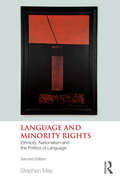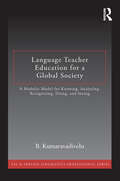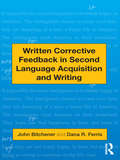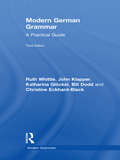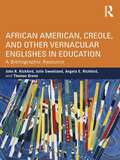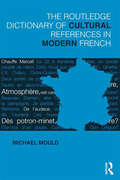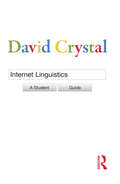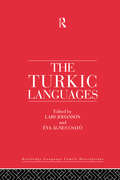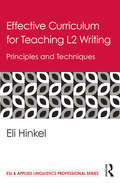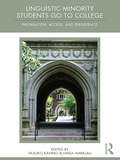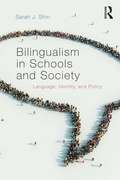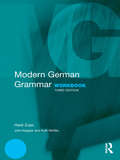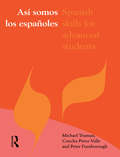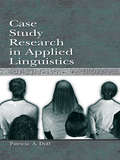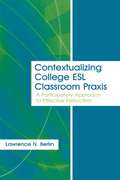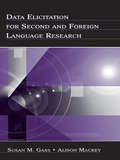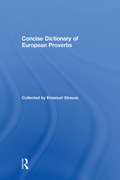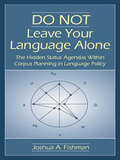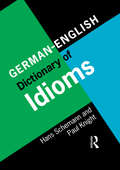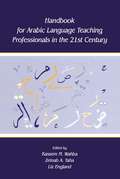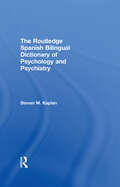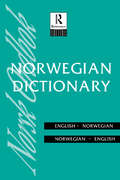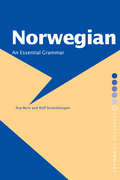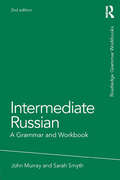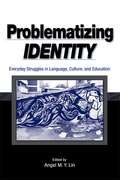- Table View
- List View
Language and Minority Rights: Ethnicity, Nationalism and the Politics of Language (Language In Social Life Ser.)
by Stephen MayThe second edition addresses new theoretical and empirical developments since its initial publication, including the burgeoning influence of globalization and the relentless rise of English as the current world language. May’s broad position, however, remains largely unchanged. He argues that the causes of many of the language-based conflicts in the world today still lie with the nation-state and its preoccupation with establishing a 'common' language and culture via mass education. The solution, he suggests, is to rethink nation-states in more culturally and linguistically plural ways while avoiding, at the same time, essentializing the language-identity link. This edition, like the first, adopts a wide interdisciplinary framework, drawing on sociolinguistics, applied linguistics, sociology, political theory, education and law. It also includes new discussions of cosmopolitanism, globalization, the role of English, and language and mobility, highlighting the ongoing difficulties faced by minority language speakers in the world today.
Language Teacher Education for a Global Society: A Modular Model for Knowing, Analyzing, Recognizing, Doing, and Seeing (ESL & Applied Linguistics Professional Series)
by B. KumaravadiveluThe field of second/foreign language teacher education is calling out for a coherent and comprehensive framework for teacher preparation in these times of accelerating economic, cultural, and educational globalization. Responding to this call, this book introduces a state-of-the-art model for developing prospective and practicing teachers into strategic thinkers, exploratory researchers, and transformative teachers. The model includes five modules: Knowing, Analyzing, Recognizing, Doing, and Seeing (KARDS). Its goal is to help teachers understand: how to build a viable professional, personal and procedural knowledge-base, how to analyze learner needs, motivation and autonomy, how to recognize their own identities, beliefs and values, how to do teaching, theorizing and dialogizing, and how to see their own teaching acts from learner, teacher, and observer perspectives. Providing a scaffold for building a holistic understanding of what happens in the language classroom, this model eventually enables teachers to theorize what they practice and practice what they theorize. With its strong scholarly foundation and its supporting reflective tasks and exploratory projects, this book is immensely useful for students, practicing teachers, teacher educators, and educational researchers who are interested in exploring the complexity of language teacher education.
Written Corrective Feedback in Second Language Acquisition and Writing
by John Bitchener Dana R. FerrisWhat should language and writing teachers do about giving students written corrective feedback? This book surveys theory, research, and practice on the important and sometimes controversial issue of written corrective feedback, also known as “error/grammar correction,” and its impact on second language acquisition and second language writing development. Offering state-of-the-art treatment of a topic that is highly relevant to both researchers and practitioners, it critically analyzes and synthesizes several parallel and complementary strands of research — work on error/feedback (both oral and written) in SLA and studies of the impact of error correction in writing/composition courses — and addresses practical applications. Drawing from both second language acquisition and writing/composition literature, this volume is the first to intentionally connect these two separate but important lines of inquiry.
Modern German Grammar: A Practical Guide (Modern Grammars)
by Ruth Whittle John Klapper Katharina Glöckel Bill Dodd Christine Eckhard-BlackModern German Grammar: A Practical Guide, Third Edition is an innovative reference guide to German, combining traditional and function-based grammar in a single volume. The Grammar is divided into two parts. Part A covers grammatical categories such as word order, nouns, verbs and adjectives. Part B is organised according to language functions and notions such as: making introductions asking for something to be done delivering a speech possibility satisfaction. The book addresses learners’ practical needs and presents grammar in both a traditional and a communicative setting. New to this edition, and building on feedback from the previous edition: The rules of the latest (and so far final) spelling reform have been implemented throughout. Examples of usage have been updated and consideration given to Swiss and Austrian variants. The chapter on register has been expanded and now includes youth language and frequently used Anglicisms in German. The Index now has even more key words; it has also been redesigned to differentiate between German words, grammar terms, and functions, thus making it more user-friendly. The Grammar assumes no previous grammatical training and is intended for all those who have a basic knowledge of German, from intermediate learners in schools and adult education to undergraduates taking German as a major or minor part of their studies. The Grammar is accompanied by a third edition of Modern German Grammar Workbook (ISBN 978-0-415-56725-1) which features exercises and activities directly linked to the Grammar. Ruth Whittle is Lecturer, John Klapper is Professor of Foreign Language Pedagogy, Katharina Glöckel is the Austrian Lektorin and Bill Dodd is Professor of Modern German Studies – all at the University of Birmingham. Christine Eckhard-Black is Tutor and Advisor in German at the Oxford University Language Centre.
African American, Creole, and Other Vernacular Englishes in Education: A Bibliographic Resource (NCTE-Routledge Research Series)
by John R. Rickford Julie Sweetland Angela E. Rickford Thomas GranoMore than 50 years of scholarly attention to the intersection of language and education have resulted in a rich body of literature on the role of vernacular language varieties in the classroom. This field of work can be bewildering in its size and variety, drawing as it does on the diverse methods, theories, and research paradigms of fields such as sociolinguistics, applied linguistics, psychology, and education. Compiling most of the publications from the past half century that deal with this critical topic, this volume includes more than 1600 references (books, articles in journals or books, and web-accessible dissertations and other works) on education in relation to African American Vernacular English [AAVE], English-based pidgins and creoles, Latina/o English, Native American English, and other English vernaculars such as Appalachian English in the United States and Aboriginal English in Australia), with accompanying abstracts for approximately a third of them. This comprehensive bibliography provides a tool useful for those interested in the complex issue of how knowledge about language variation can be used to more effectively teach students who speak a nonstandard or stigmatized language variety.
The Routledge Dictionary of Cultural References in Modern French
by Michael MouldThe Routledge Dictionary of Cultural References in Modern French reveals the hidden cultural dimension of contemporary French, as used in the press, going beyond the limited and purely lexical approach of traditional bilingual dictionaries. Even foreign learners of French who possess a good level of French often have difficulty in fully understanding French articles, not because of any linguistic shortcomings on their part but because of their inadequate knowledge of the cultural references. This cultural dictionary of French provides the reader with clear and concise explanations of the crucial cultural dimension behind the most frequently used words and phrases found in the contemporary French press. This vital background information, gathered here in this innovative and entertaining dictionary, will allow readers to go beyond a superficial understanding of the French press and the French language in general, to see the hidden yet implied cultural significance that is so transparent to the native speaker. Key features: a broad range of cultural references from the historical and literary to the popular and classical, with an in-depth analysis of punning mechanisms. over 3,000 cultural references explained a three-level indicator of frequency over 600 questions to test knowledge before and after reading. The Routledge Dictionary of Cultural References in Modern French is the ideal reference for all undergraduate and postgraduate students of French seeking to enhance their understanding of the French language. It will also be of interest to teachers, translators and Francophiles alike. French students in khâgne, Sciences-Po and schools of journalism will also find this valuable and relevant for their studies.
Internet Linguistics: A Student Guide
by David CrystalThe Internet is now an integral part of contemporary life, and linguists are increasingly studying its influence on language. In this student-friendly guidebook, leading language authority Professor David Crystal follows on from his landmark bestseller Language and the Internet and presents the area as a new field: Internet linguistics. In his engaging trademark style, Crystal addresses the online linguistic issues that affect us on a daily basis, incorporating real-life examples drawn from his own studies and personal involvement with Internet companies. He provides new linguistic analyses of Twitter, Internet security, and online advertising, explores the evolving multilingual character of the Internet, and offers illuminating observations about a wide range of online behaviour, from spam to exclamation marks. Including many activities and suggestions for further research, this is the essential introduction to a critical new field for students of all levels of English language, linguistics and new media.
The Turkic Languages (Routledge Language Family Series)
by Lars Johanson Éva Ágnes JohansonThe Turkic Languages examines the modern languages within this wide-ranging language family and gives an historical overview of their development.The first part covers generalities, providing an introduction to the grammatical traditions, subgrouping and writing systems of this language family.The latter part of the book focuses on descriptions of the individual languages themselves. Each language description gives an overview of the language followed by detail on phonology, morphology, syntax, lexis and dialects. The language chapters are similarly structured to enable the reader to access and compare information easily.Each chapter represents a self-contained article written by a recognised expert in the field. Suggestions are made for the most useful sources of further reading and the work is comprehensively indexed.
Effective Curriculum for Teaching L2 Writing: Principles and Techniques (ESL & Applied Linguistics Professional Series)
by Eli HinkelEffective Curriculum for Teaching L2 Writing sets out a clear big picture for curricular thinking about L2 writing pedagogy and offers a step-by-step guide to curriculum design with practical examples and illustrations. Its main purpose is to help pre-service and practicing teachers design courses for teaching academic writing and to do this as efficiently and effectively as possible. Bringing together the what and the how-to with research-based principles, what sets this book apart is its overarching focus on language pedagogy and language building. Part 1 examines curricular foundations in general and focuses on what is socially valued in L2 writing and pedagogy at school and at the college and university level. Part 2 is concerned with the nitty-gritty̶—the daily realities of curricular design and classroom instruction. Part 3 takes a close look at the key pedagogical ingredients of teaching academic L2 writing: vocabulary and collocations, grammar for academic writing, and down-to-earth techniques for helping L2 writers to organize discourse and ideas. The Appendix provides an extensive checklist for developing curricula for a course or several courses in language teaching.
Linguistic Minority Students Go to College: Preparation, Access, and Persistence
by Yasuko Kanno Linda HarklauCurrently, linguistic minority students – students who speak a language other than English at home – represent 21% of the entire K-12 student population and 11% of the college student population. Bringing together emerging scholarship on the growing number of college-bound linguistic minority students in the K-12 pipeline, this ground-breaking volume showcases new research on these students’ preparation for, access to, and persistence in college. Other than studies of their linguistic challenges and writing and academic literacy skills in college, little is known about the broader issues of linguistic minority students’ access to and success in college. Examining a variety of factors and circumstances that influence the process and outcome, the scope of this book goes beyond students’ language proficiency and its impact on college education, to look at issues such as student race/ethnicity, gender, SES, and parental education and expectations. It also addresses structural factors in schooling including tracking, segregation of English learners from English-fluent peers, availability and support of institutional personnel, and collegiate student identity and campus climate. Presenting state-of-the-art knowledge and mapping out a future research agenda in an extremely important and yet understudied area of inquiry, this book advances knowledge in ways that will have a real impact on policy regarding linguistic minority immigrant students’ higher education opportunities.
Bilingualism in Schools and Society: Language, Identity, and Policy
by Sarah J. ShinThis book is an introduction to the social and educational aspects of bilingualism. It presents an overview of a broad range of sociolinguistic and political issues surrounding the use of two languages, including code-switching in popular music, advertising, and online social spaces. It offers a well-informed discussion of what it means to study and live with multiple languages in a globalized world and practical advice on raising bilingual children.
Modern German Grammar Workbook (Modern Grammar Workbooks)
by Heidi Zojer John Klapper Ruth Whittle William J Dodd Christine Eckhard-BlackModern German Grammar Workbook, Third Edition, is an innovative book of exercises and language tasks for intermediate and advanced learners of German. The book is divided into three sections: Section 1 provides exercises based on essential grammatical structures. Section 2 practises everyday functions (e.g. making introductions, apologising, expressing needs). Section 3 contains realistic role-plays in short scenes, set in a range of different contexts. A comprehensive answer key at the back of the book enables you to check on your progress. Implementing feedback from users of the second edition, this third edition now features: even more extensive cross-referencing to the related Modern German Grammar, Third Edition spelling following the latest reform representation of the German of Switzerland and Austria. Modern German Grammar Workbook, Third Edition, is ideal for all learners who want to deepen their knowledge of German, including intermediate and advanced students at schools, in adult education and within higher education. It can be used independently or alongside Modern German Grammar, Third Edition (ISBN 978-0-415-56726-8) also published by Routledge.
Asi somos los espanoles: Spanish Skills for Advanced Students
by Peter Furnborough Concha Pérez Valle Michael TrumanAsí somos los españoles provides advanced students with a genuine insight into Spanish culture via a range of practical activities and exercises. The courses includes many unscripted recordings of interviews with Spaniards from a variety of geographical areas. Students explore these recordings through activities designed to develop listening, speaking, reading and writing skills.This course suitable for classroom use or independent learning.
Case Study Research in Applied Linguistics (Second Language Acquisition Research Ser.)
by Patricia DuffCase studies of individual language learners are a valuable means of illustrating issues connected with learning, using, and in some cases, losing another language. Yet, even though increasing numbers of graduate students and scholars conduct research using case studies or mix quantitative and qualitative methods, there are no dedicated applied lin
Contextualizing College ESL Classroom Praxis: A Participatory Approach to Effective Instruction (Language, Culture, And Teaching Ser.)
by Lawrence N. BerlinContextualizing College ESL Classroom Praxis: A Participatory Approach to Effective Instruction provides pre-service and in-service teachers with a model for engaging in effective instruction with the variety of students encountered in college English as a second language or foreign language classrooms. Along with the model, the text is designed to
Data Elicitation for Second and Foreign Language Research (Second Language Acquisition Research Ser.)
by Susan M. Gass Alison MackeyThis timely reference guide is specifically directed toward the needs of second language researchers, who can expect to gain a clearer understanding of which techniques may be most appropriate and fruitful in given research domains. Data Elicitation for Second and Foreign Language Research is a perfect companion to the same author team‘s bestsellin
Concise Dictionary of European Proverbs
by Emanuel StraussThis concise edition of the definitive 3-volume Dictionary of European Proverbs constitutes a fascinating collection of proverbs in 29 languages. The entries are arranged alphabetically according to the English equivalent, allowing the reader to identify common trends easily and quickly. * All proverbs listed in original language * 29 European languages featured * Includes all proverbs in current use * Thoroughly checked by language specialists to ensure accuracy. The Concise Dictionary of European Proverbs is based on over 40 years in-depth research by the compiler. It is an essential reference source for linguists, ethnologists and folklorists, and of interest to anyone wanting to know about the origins, development and current usage of the proverb. Emanuel Straussis a world-renowned expert on proverbs.
DO NOT Leave Your Language Alone: The Hidden Status Agendas Within Corpus Planning in Language Policy
by Joshua A. FishmanThis book, focused on corpus planning in language policy, provides a broad, integrative framework and also discusses multiple languages in detail. It provides readers with great familiarity with a wide range of language cases and at the same time gives them the theoretical tools and analysis to see how they inter-relate.The novelty of this volume i
German/English Dictionary of Idioms: Supplement To The German/english Dictionary Of Idioms
by Hans SchemannThis unique dictionary covers all the major German idioms and is probably the richest source of contemporary German idioms available, with 33,000 headwords. Within each entry the user is provided with: English equivalents; variants; contexts and precise guidance on the degree of currency/rarity of an idiomatic expression. This dictionary is an essential reference for achieving fluency in the language. It will be invaluable for all serious learners and users of German. Not for sale in Germany, Austria and Switzerland.
Handbook for Arabic Language Teaching Professionals in the 21st Century
by Kassem M. Wahba Liz England Zeinab A. TahaThis landmark volume offers an introduction to the field of teaching Arabic as a foreign or second language. Recent growth in student numbers and the demand for new and more diverse Arabic language programs of instruction have created a need that has outpaced the ability of teacher preparation programs to provide sufficient numbers of well-qualified professional teachers at the level of skill required. Arabic language program administrators anticipate that the increases in enrollment will continue into the next decades. More resources and more varied materials are seriously needed in Arabic teacher education and training. The goal of this Handbook is to address that need.The most significant feature of this volume is its pioneer role in approaching the field of Arabic language teaching from many different perspectives. It offers readers the opportunity to consider the role, status, and content of Arabic language teaching in the world today. The Handbook is intended as a resource to be used in building Arabic language and teacher education programs and in guiding future academic research. Thirty-four chapters authored by leaders in the field are organized around nine themes:*Background of Arabic Language Teaching;*Contexts of Arabic Language Teaching;*Communicative Competence in Arabic;*The Learners;*Assessment;*Technology Applications;*Curriculum Development, Design, and Models;*Arabic Language Program Administration and Management; and*Planning for the Future of Arabic Language Learning and Teaching.The Handbook for Arabic Language Teaching Professionals in the 21st Century will benefit and be welcomed by Arabic language teacher educators and trainers, administrators, graduate students, and scholars around the world. It is intended to create dialogue among scholars and professionals in the field and in related fields--dialogue that will contribute to creating new models for curriculum and course design, materials and assessment tools, and ultimately, better instructional effectiveness for all Arabic learners everywhere, in both Arabic-speaking and non-Arabic speaking countries.
The Routledge Spanish Bilingual Dictionary of Psychology and Psychiatry
by Steven KaplanThe Routledge Spanish Bilingual Dictionary of Psychology and Psychiatry contains over 100,000 entries making this the most comprehensive and up-to-date dictionary of its kind. The Dictionary provides concise, comprehensive and current coverage of every word or phrase used in the study and practice of psychiatry and psychology. This valuable reference tool covers all disciplines and sub-disciplines, both research-based and clinical. This is a vital resource to those in the healthcare professions, to academicians and to those who work in translation and/or interpretation, healthcare and the law who are in contact with the English and Spanish speaking communities.
Norwegian Dictionary: Norwegian-English, English-Norwegian (Routledge Bilingual Dictionaries)
by Forlang A.S. CappelensThis 2-way Dictionary is ideal for both linguists and the serious learner and user of Norwegian. Translations are supported by examples and entries are supported by an invaluable section covering aspects of Norwegian pronunciation and grammar.
Norwegian: An Essential Grammar (Routledge Essential Grammars)
by Rolf Strandskogen Ase-Berit StrandskogenNorwegian: An Essential Grammar is a reference guide to the most important aspects of contemporary Norwegian as used by native speakers. The Grammar presents a fresh and accessible description of the language. Explanations are clear, free from jargon and often accompanied by exercises. The book gives a simple, step-by-step presentation of the grammatical systems of Norwegian and demonstrates and explains usages which have proved difficult for those learning the language in the past. It is clearly laid-out for easy reference making it accessible for those at a beginner/intermediate level. This is the ideal reference source for all learners, whether studying independently or in a class.
Intermediate Russian: A Grammar and Workbook (Routledge Grammar Workbooks Ser.)
by John Murray Sarah SmythIntermediate Russian provides a reference grammar and related exercises in one volume. Varied texts from Russian sources give an insight into contemporary Russian society and culture. Features include: * texts and exercises reflecting contemporary Russian* concise grammar explanations* full exercise key * detailed index.Intermediate Russian, and its sister volume, Basic Russian, are ideal both for independent study and use in class. Together the books provide a compendium of the essentials of Russian grammar.
Problematizing Identity: Everyday Struggles in Language, Culture, and Education
by Angel M. Y. LinThis book argues that identity as a term needs to be problematized, not taken for granted � for both the risks and the potential that the concept offers to educators for understanding issues of social inequality and how social inequality is being reproduced, and for exploring possible alternative ways educators can work with identity de/formation p
